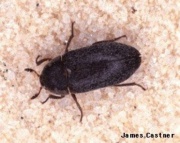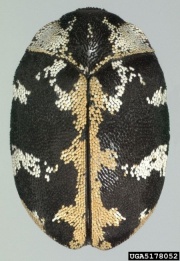Difference between revisions of "Carpet beetle"
(username removed) |
(username removed) |
||
| Line 4: | Line 4: | ||
Any of several small insects of the hide beetle genera ''Anthrenus'', ''Attagenus'' and ''Anthrenocerus''. The larvae of the carpet beetles feed on proteinaceous materials, such as [http://cameo.mfa.org/materials/fullrecord.asp?name=wool wool], [http://cameo.mfa.org/materials/fullrecord.asp?name=silk silk],[http://cameo.mfa.org/materials/fullrecord.asp?name=fur fur], [http://cameo.mfa.org/materials/fullrecord.asp?name=hair hair], [http://cameo.mfa.org/materials/fullrecord.asp?name=horn horn], [http://cameo.mfa.org/materials/fullrecord.asp?name=skin skin], [http://cameo.mfa.org/materials/fullrecord.asp?name=leather leather], and [http://cameo.mfa.org/materials/fullrecord.asp?name=feather feathers]. The adult carpet beetle is about 4 mm long with black, red and white marking on its back and a white stomach. It deposits eggs in cracks in the floor under the carpet then the developing larvae feed on the carpet. Carpet beetle have a long life cycle. The adults can eat pollen, plants materials, fabrics, fur and feathers. The eggs and larvae can become dormant in cool or dry conditions and resume their growth when the environment improves. | Any of several small insects of the hide beetle genera ''Anthrenus'', ''Attagenus'' and ''Anthrenocerus''. The larvae of the carpet beetles feed on proteinaceous materials, such as [http://cameo.mfa.org/materials/fullrecord.asp?name=wool wool], [http://cameo.mfa.org/materials/fullrecord.asp?name=silk silk],[http://cameo.mfa.org/materials/fullrecord.asp?name=fur fur], [http://cameo.mfa.org/materials/fullrecord.asp?name=hair hair], [http://cameo.mfa.org/materials/fullrecord.asp?name=horn horn], [http://cameo.mfa.org/materials/fullrecord.asp?name=skin skin], [http://cameo.mfa.org/materials/fullrecord.asp?name=leather leather], and [http://cameo.mfa.org/materials/fullrecord.asp?name=feather feathers]. The adult carpet beetle is about 4 mm long with black, red and white marking on its back and a white stomach. It deposits eggs in cracks in the floor under the carpet then the developing larvae feed on the carpet. Carpet beetle have a long life cycle. The adults can eat pollen, plants materials, fabrics, fur and feathers. The eggs and larvae can become dormant in cool or dry conditions and resume their growth when the environment improves. | ||
| − | See also [http://cameo.mfa.org/materials/fullrecord.asp?name=common | + | See also [http://cameo.mfa.org/materials/fullrecord.asp?name=common%20carpet%20beetle common carpet beetle], [http://cameo.mfa.org/materials/fullrecord.asp?name=furniture%20carpet%20beetle furniture carpet beetle], [http://cameo.mfa.org/materials/fullrecord.asp?name=varied%20carpet%20beetle varied carpet beetle], and [http://cameo.mfa.org/materials/fullrecord.asp?name=black%20carpet%20beetle black carpet beetle]. |
[[File:Image3_803026.jpg|thumb|Carpet beetle]] | [[File:Image3_803026.jpg|thumb|Carpet beetle]] | ||
| Line 24: | Line 24: | ||
== Authority == | == Authority == | ||
| − | * | + | * Hermann Kuhn, ''Conservation and Restoration of Works of Art and Antiquities'', Butterworths, London, 1986 |
| − | * | + | * Rosalie Rosso King, ''Textile Identification, Conservation, and Preservation'', Noyes Publications, Park Ridge, NJ, 1985 |
| − | * | + | * Random House, ''Webster's Encyclopedic Unabridged Dictionary of the English Language'', Grammercy Book, New York, 1997 |
* ''The American Heritage Dictionary'' or ''Encarta'', via Microsoft Bookshelf 98, Microsoft Corp., 1998 | * ''The American Heritage Dictionary'' or ''Encarta'', via Microsoft Bookshelf 98, Microsoft Corp., 1998 | ||
Revision as of 06:28, 24 July 2013
Description
Any of several small insects of the hide beetle genera Anthrenus, Attagenus and Anthrenocerus. The larvae of the carpet beetles feed on proteinaceous materials, such as wool, silk,fur, hair, horn, skin, leather, and feathers. The adult carpet beetle is about 4 mm long with black, red and white marking on its back and a white stomach. It deposits eggs in cracks in the floor under the carpet then the developing larvae feed on the carpet. Carpet beetle have a long life cycle. The adults can eat pollen, plants materials, fabrics, fur and feathers. The eggs and larvae can become dormant in cool or dry conditions and resume their growth when the environment improves.
See also common carpet beetle, furniture carpet beetle, varied carpet beetle, and black carpet beetle.
Synonyms and Related Terms
carpet beetles (pl.); Anthrenus; Attagenus; Anthrenocerus; buffalo bug
Additional Information
University of Florida, Department of Entomology and Nematology: Insect website
Additional Images
Authority
- Hermann Kuhn, Conservation and Restoration of Works of Art and Antiquities, Butterworths, London, 1986
- Rosalie Rosso King, Textile Identification, Conservation, and Preservation, Noyes Publications, Park Ridge, NJ, 1985
- Random House, Webster's Encyclopedic Unabridged Dictionary of the English Language, Grammercy Book, New York, 1997
- The American Heritage Dictionary or Encarta, via Microsoft Bookshelf 98, Microsoft Corp., 1998


